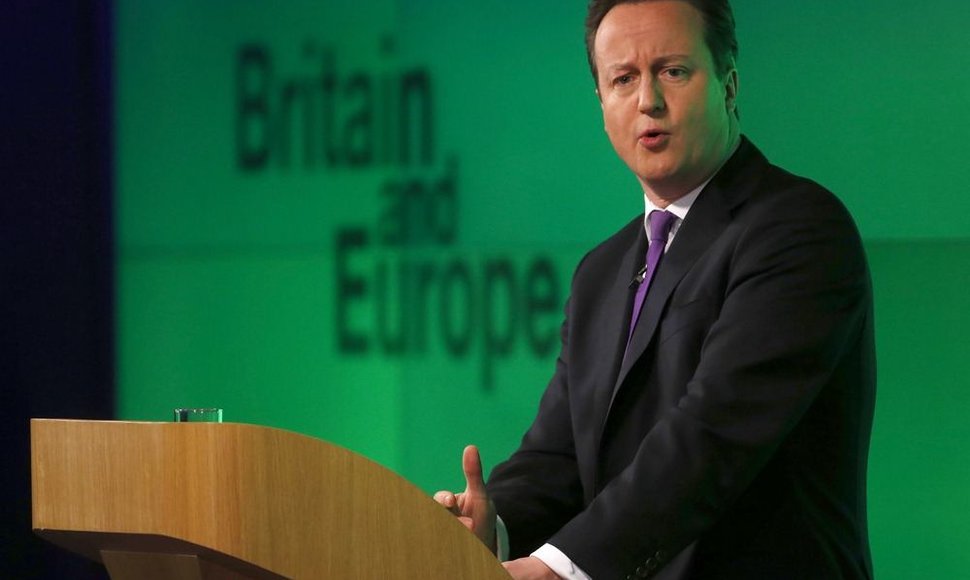The reaction in Lithuania was huge – talk shows on Cameron’s speech were held on national TV and radio. The UK has a special place in Lithuanian minds and hearts. The English language is the best known foreign language among the young generation of Lithuanians. The UK is the prime destination for foreign studies as well as for work abroad among Lithuanians. A decade ago, the UK was a much more enthusiastic supporter of the Baltics’ membership in the EU and NATO than France or Germany. Officially London shares the same degree of skepticism as Baltic politicians towards the development of democracy in Russia and the Kremlin’s attitude to the neighbors of Russia. In recent years, meetings of prime ministers of the three Baltic countries, five Scandinavian states and the UK in London and Stockholm also demonstrated a special sympathy of 10 Downing Street to our region.
The Baltic and British elites share the same skepticism towards the model of the welfare state, which is implemented in the majority of EU states. Is such an ‘anti-Socialist’ point of view on social issues beneficial for ordinary people of the Baltics – that is the question (actually, the UK practice is much closer to a welfare state than the wild capitalism of Lithuania and Latvia). “As Chancellor Merkel has said, if Europe today accounts for just over 7 percent of the world’s population, produces around 25 percent of global GDP and has to finance 50 percent of global social spending, then it’s obvious that it will have to work very hard to maintain its prosperity and way of life,” Cameron said. He added “it is neither right nor necessary to claim that the integrity of the single market, or full membership of the European Union requires the working hours of British hospital doctors to be set in Brussels, irrespective of the views of British parliamentarians and practitioners.” Lithuanian President Dalia Grybauskaitė and rather disliked by her Lithuania’s ruling Social Democrats would agree with everything in these quotes, except the finger pointing at Brussels.
Brussels is the holy cow for the Baltic political leaders. Their reaction to Cameron’s speech was not as critical in Vilnius as it was in Berlin or Paris, but Cameron cannot expect some significant support in this case here. Gediminas Kirkilas, Social Democrat MP and former PM, was right stating that Cameron’s speech was not so impressive because the British Conservative PM was obviously solving his Conservative Party’s problems in the coming general elections of 2015 – otherwise, Cameron would announce the date of the referendum on the day of elections. Cameron’s message to his electorate, meaning ‘you’ll get a referendum later if you vote for my party in 2015,’ looks like a political PR trick.
The Baltic economies are highly dependent on the co-financing of EU funds. It is the main reason why only some 30-40 percent of readers of the main Lithuanian-language Internet sites expressed their solidarity with Cameron’s ideas about the EU, on the Internet polls.
The EU, like the Roman Empire, has a civilizing mission. Last week, Lithuania was awarded with the prestigious EU RegioStars award for a project of employment of deaf people, using EU funds. Would somebody care about those 2,000 unemployed deaf people (out of a total of 8,000 deaf people in Lithuania) if not for EU membership? Probably not.
The EU, like the Roman Empire, can also unwillingly cause some nasty habits. Only last year did it become public that Lithuanian prosecutors suspected that the money for the allegedly non-official financing of Lithuania’s Labor Party could have come from taking financial support from companies which got EU co-financing money via the Labor-controlled Economy Ministry in 2006 (however, no official accusations were made). The official financial support to Lithuania’s Liberal Movement (when such support for political parties from companies was still allowed and when the Liberals controlled the Transport Ministry) from road construction companies, which were receiving the EU co-financing, also can raise questions.
Anyway, Lithuania is regarded by Brussels as quite a transparent EU funds user – everything is understandable in comparison – just look at Poland (or, in the case of a wish for a gloomier picture, at Greece, Romania or Bulgaria). Last week, Brussels stopped delivery of some 900 million euros of EU funds to build some decent roads in Poland (such construction is the wish of each Balt who experienced westward travel via the terrible Polish roads), and the future of a total of 4 billion euros allocated by Brussels for Polish projects became questionable after the findings about not very transparent public procurement deals in Poland related to the EU co-financed roads construction.
The support for Cameron’s speech by some one-third of Lithuanian online newspaper readers shows that the EU is capable of irritating Lithuanians sometimes. For example, the obligatory Brussels-imposed levels of excise duties on gasoline and tobacco are stupid in the case of Lithuania, which is surrounded by the territories of Belarus and Russia’s Kaliningrad district where excise duties on these items are much lower – it causes mass smuggling of gasoline and tobacco into Lithuania. In this case Lithuanians understand Cameron’s euroscepticism. Luc Van den Brande, former president of the EU’s Committee of the Regions and former minister-president of Flanders, was right in stating that political decisions should be relegated to the local, regional, or national levels of government, “unless a pan-European approach is going to be more effective.”












